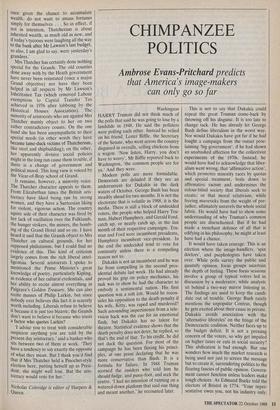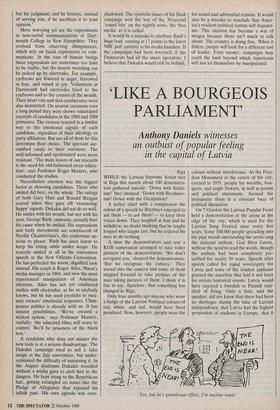CHIMPANZEE POLITICS
Ambrose Evans-Pritchard predicts that America's image-makers can only go so far.
Washington HARRY Truman did not think much of the polls that said he was going to lose by a landslide in 1948. He said the pollsters were polling each other. Instead he relied on his friend, Lester Biffle, the Secretary of the Senate, who went across the country disguised in overalls, selling chickens from a wagon. 'Now listen, Harry, you don't have to worry', Mr Biffle reported back to Washington, 'the common people are for ya.' And they were.
Modern polls are more formidable. Democrats are deluded if they see an undercurrent for Dukakis in the dark waters of October. George Bush has been steadily ahead for two months. It is not the electorate that is volatile in 1988, it is the media. There is still a block of undecided voters, the people who helped Harry Tru- man, Hubert Humphrey, and Gerald Ford, catch up, or nearly catch up, in the last month of their respective campaigns. Tru- man and Ford were incumbent presidents, Humphrey incumbent vice-president. In the end the undecided tend to vote for continuity unless there is a compelling reason not to. Dukakis is not an incumbent and he was far from compelling in the second pres- idential debate last week. He had already proved his grip on policy mechanics, his task was to show he had the character to embody a sentimental nation. His first question was a soft lob. Would he recon- sider his opposition to the death penalty if his wife, Kitty, was raped and murdered? Such astounding impertinence from a tele- vision hack was the cue for an emotional flash, but Dukakis has no talent for theatre. Statistical evidence shows that the death penalty does not deter, he replied, so that's the end of that. To his credit, he did not duck the question. For most of the campaign he has been fleeing his princi- ples, at one point declaring that he was more conservative than Bush. It is a formula for failure. In 1948 Truman scorned the insiders who told him he should fudge, and pussy-foot, and seek the centre. 'I had no intention of running on a watered-down platform that said one thing and meant another,' he recounted later. This is not to say that Dukakis could repeat the great Truman come-back by throwing off his disguise. It is too late to change tack. He has already let George Bush define liberalism in the worst way. Nor would Dukakis have got far if he had fought a campaign from the outset proc- laiming 'big government', if he had shown an unabashed affection for the collectivist experiments of the 1970s. Instead, he would have had to acknowledge that liber- alism went wrong, that 'affirmative action', which promotes minority races by quotas and special treatment, boils down to affirmative racism and undermines the colour-blind society that liberals seek to create; or that moral relativism, while freeing mavericks from the weight of pre- judice, ultimately unravels the whole social fabric. He would have had to show some understanding of why Truman's common people are disenchanted. But if he had made a trenchant defence of all that is edifying in his philosophy, he might at least have had a chance.
It would have taken courage. This is an election where the image-handlers, 'spin doctors', and psephologists have taken over. While polls survey the public and quantify opinion, focus groups ascertain the depth of feeling. These focus sessions involve a group of typical voters led in discussion by a moderator, while analysts sit behind a two-way mirror listening in. The findings are used to keep the candi- date out of trouble. George Bush rarely mentions the unpopular Contras, though he gets excited about their cause in private. Dukakis avoids association with the 'alternative lifestyles' on the fringe of the Democractic coalition. Neither faces up to the budget deficit. It is not a pressing concern of the voters, so why get impaled on higher taxes or cuts in social security? This abdication is bad enough. But one wonders how much the market research is being used not just to screen the message but to create it, surrendering politics to the floating fancies of public opinion. Govern- ment cannot function unless leaders make tough choices. As Edmund Burke told the electors of Bristol in 1774: 'Your repre- sentative owes you, not his industry only,
but his judgment; and he betrays, instead of serving you, if he sacrifices it to your opinion.'
More worrying yet are the experiments in non-verbal communications at Dart- mouth College in New Hampshire. They evolved from observing chimpanzees, which rely on facial expressions to com- municate. In the case of human beings these expressions are sometimes too faint to be visible, but the muscle twitching can be picked up by electrodes. For example, eyebrows are lowered in anger, furrowed in fear, and raised in joy. Volunteers at Dartmouth had electrodes fixed to the eyebrows and to the corners of the mouth. Their heart rate and skin conductance were also monitored. On several occasions over a long period they were shown videotaped excerpts of candidates in the 1984 and 1988 primaries. The viewers reacted in a similar way to the emotional signals of each candidate, regardless of their ideology or party affiliation. But not all of them let this determine their choice. The ignorant suc- cumbed easily to their emotions. The well-informed and opinionated were more resistant. 'The main lesson of our research is the need for old-fashioned civics educa- tion', says Professor Roger Masters, who conducted the studies.
Nevertheless emotion was the biggest factor in choosing candidates. Those who smiled did best, on the whole. The ratings of both Gary Hart and Ronald Reagan soared when they gave . off 'reassuring/ happy' signals. Dukakis did not do so well. He smiles with his mouth, but not with his eyes. George Bush, curiously, actually hurt his cause when he smiled. His expressions and body movements are reminiscent of Neville Chamberlain's, the conformist an- xious to please. Bush has since learnt to keep his losing smile under wraps. He scarcely smiled at all in his convention speech at the New Orleans Convention. He has perfected the warm, dignified look instead. His coach is Roger Ailes, Nixon's media manager in 1968, and now the most experienced manipulator of American elections. Ailes has not yet conducted studies with electrodes, as far as anybody knows, but he has used joysticks to mea- sure viewers' emotional responses. Chim- panzee politics is already with us. It has sinister possibilities. 'We've created a wicked system,' says . Professor Masters, ruefully; 'the educated elites will cease to control. We'll be prisoners of the black box.'
A candidate who does not master the new tools is at a serious disadvantage. The Dukakis campaign tried to sell a false image at the July convention, but under- estimated the difficulty of sustaining it. In the August doldrums Dukakis travelled without a media guru to alert him to the dangers. He kept rising to the Republican bait, getting entangled on issues like the Pledge of Allegiance that exposed his leftish past. His own agenda was over-
shadowed. The symbolic issues of the Bush campaign won the war of the 30-second `sound bite' on the nightly news, the 'free media' as it is called.
It would be a mistake to attribute Bush's huge lead, running at 17 points in the latest NBC poll, entirely to his media handlers. If the campaigns had been reversed, if the Democrats had all the smart operators, I believe that Dukakis would still be behind,
for sound and substantial reasons. It would also be a mistake to conclude that Amer- ica's resilient political system will degener- ate. This election has become a war of images because there isn't much to talk about. The country is doing fine. When it falters, people will look for a different sort of leader. Even sooner, campaigns may reach the limit beyond which Americans will not let themselves be manipulated.



































































 Previous page
Previous page